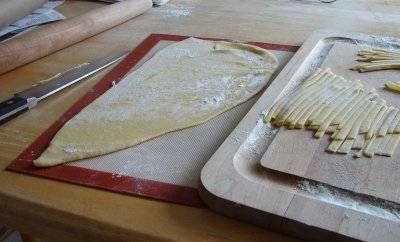|
| | Many people think that fresh pasta is always better and superior to dry pasta. In fact, fresh and dry pasta are different from each other, almost like two completely separate dishes which you shouldn't really think of in the same terms. different from each other, almost like two completely separate dishes which you shouldn't really think of in the same terms.
Fresh pasta is made from all purpose flour and eggs. It has a very tender texture and it works very well with creamy and buttery sauces. Since fresh pasta contains eggs, it's more filling than dry pasta, so you don't need to serve as large portions. If you don't have the time or interest in making fresh pasta at home, another option would be to buy fresh pasta from the supermarket. These are not fresh in the literal sense since they have been pasteurized and packaged in a way that allows to them to sit on the shelf for a few weeks. However, the texture of store bought fresh pasta is similar to homemade fresh pasta.
Dried pasta is made from hard durum wheat (semolina) flour and water. You can get all kinds of shapes and sizes ranging from spaghetti to penne. If you use dry pasta that contains eggs, then the pasta will expand more as it boils, so it's definitely more filling and the serving portions may be smaller. All dried pastas are not the same however and for a better texture and taste, you can't beat 100% durum wheat pastas. In fact, it's the Italian law that dried pastas produced there need to be made of 100% durum wheat. Because durum wheat has a very high protein content, the pasta gets more of a bite to it.
The way the pasta is extruded and dried also makes a big difference. The method makes for uniform and smooth or coarser texture, depending on how it's made.
| |


